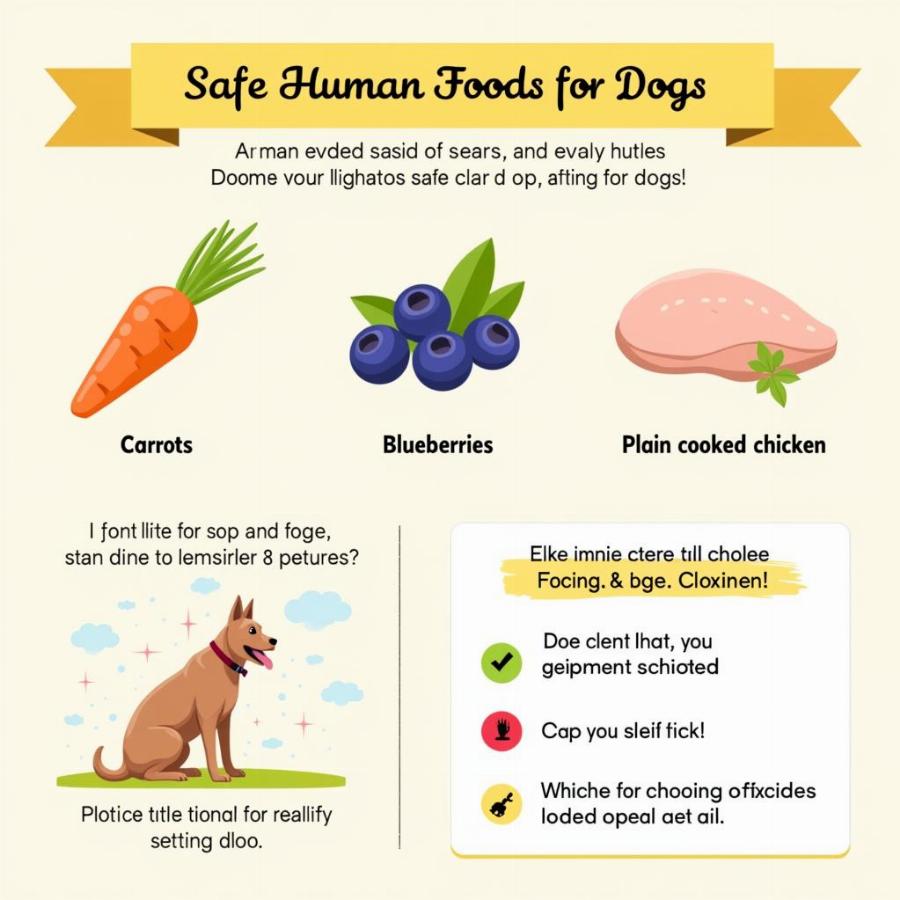The “dat dog menu” search might initially seem like it’s about finding food specifically for dogs named Dat. However, as dog care experts at Beaut Dogs, we understand that you’re likely looking for information about safe and healthy food options for your canine companion, regardless of their name. This comprehensive guide will cover everything you need to know about choosing the right diet for your dog, whether you’re considering commercial dog food, homemade meals, or even sharing some of your own food with your furry friend.
Decoding Your Dog’s Dietary Needs
Just like humans, dogs require a balanced diet to thrive. This balance involves the right proportions of proteins, fats, carbohydrates, vitamins, and minerals. Understanding these nutritional needs is crucial for selecting the best “dat dog menu.” A dog’s age, breed, size, activity level, and overall health status all play a role in determining their specific dietary requirements. Puppies, for instance, need more calories and specific nutrients for growth, while senior dogs may benefit from a diet lower in calories and higher in fiber.
Commercial Dog Food: Kibble vs. Canned
Commercial dog foods are the most convenient option for many owners. They come in two main forms: dry kibble and canned wet food. Kibble is generally more affordable and has a longer shelf life, while canned food is often more palatable and contains higher moisture content. Both types can provide complete and balanced nutrition, but it’s essential to choose a high-quality brand that meets the Association of American Feed Control Officials (AAFCO) standards.
Choosing the Right Commercial Food
When browsing the seemingly endless options of commercial dog food, look for brands that list whole meat or meat meal as the primary ingredient. Avoid foods with fillers like corn, wheat, and soy, which offer little nutritional value. Also, consider your dog’s specific needs. Are they prone to allergies? Do they have sensitive stomachs? There are specialized formulas available for various dietary restrictions and health conditions.
Homemade Dog Food: A Labor of Love
Some dog owners prefer to prepare their dog’s food from scratch. This offers complete control over the ingredients and allows for customization based on the dog’s individual needs. However, it’s crucial to consult with a veterinary nutritionist to ensure the homemade diet is balanced and provides all the necessary nutrients. An improperly formulated homemade diet can lead to nutritional deficiencies or excesses, which can negatively impact the dog’s health.
Building a Balanced Homemade Meal
Creating a balanced homemade “dat dog menu” involves carefully selecting and combining ingredients like meat, vegetables, grains, and supplements. A veterinary nutritionist can help you determine the appropriate proportions of each ingredient and recommend any necessary supplements. Remember, a balanced diet is not simply about throwing together some leftover meat and vegetables; it requires careful planning and preparation.
The Human Food Debate: What’s Safe for Sharing?
While it’s tempting to share your food with your furry friend, not all human foods are safe for dogs. Some foods, like chocolate, grapes, and onions, are toxic and can cause serious health problems. Other foods, like cooked chicken and certain vegetables, can be offered in moderation as healthy treats. Always research before sharing any human food with your dog.
 Safe Human Foods for Dogs
Safe Human Foods for Dogs
Conclusion: The Best “Dat Dog Menu” is a Balanced One
Whether you choose commercial dog food, homemade meals, or a combination of both, the most important factor is providing a balanced and nutritious diet tailored to your dog’s individual needs. By understanding your dog’s dietary requirements and making informed choices, you can ensure your furry friend stays happy, healthy, and full of energy.
FAQs about Dog Nutrition
- How much should I feed my dog? Feeding amounts vary depending on factors like age, breed, size, and activity level. Refer to the feeding guidelines on your dog food packaging or consult with your veterinarian for personalized recommendations.
- What are the signs of a food allergy in dogs? Common signs include itching, skin rashes, gastrointestinal upset, and ear infections.
- Can I switch my dog’s food suddenly? Sudden food changes can cause digestive upset. Gradually introduce new food over several days, mixing it with the old food.
- Are grain-free diets better for dogs? Not necessarily. Some dogs may benefit from grain-free diets, while others may not. Consult with your veterinarian to determine if a grain-free diet is right for your dog.
- What are some healthy treats for dogs? Healthy treats include fruits like apples and bananas (in moderation), vegetables like carrots and green beans, and lean protein sources like cooked chicken or fish.
Beaut Dogs is your trusted source for all things dog-related. We offer expert advice and resources to help you provide the best possible care for your canine companion. For any questions or concerns, please contact us at Email: [email protected]. Beaut Dogs is committed to helping you navigate the wonderful world of dog ownership.